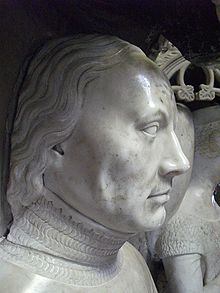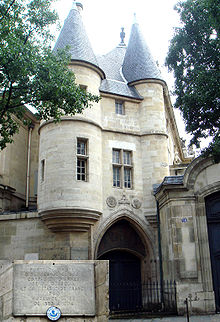- Olivier de Clisson
-
Olivier de Clisson (1336 – 23 April 1407), nicknamed "The Butcher", was a Breton soldier, the son of the Olivier de Clisson who was put to death in 1343 on the suspicion of having wished to give up Nantes to the English.
He was brought up in England, where his mother, Jeanne de Belleville, married her second husband. On his return to Brittany he took arms on the side of John de Montfort, who was supported by the English. Olivier distinguished himself at the Battle of Auray (1364), where he lost an eye in the fighting, and earned the nickname "Butcher" because his troops were ordered to take no prisoners. Later, due to differences with de Montfort, Olivier went over to the side of Montfort's rivals, and therefore, France.
In 1370, Olivier acquired the lordship of Josselin and began to build Josselin Castle, an imposing new fortress with eight towers.[1] The same year, he joined Bertrand du Guesclin, who had lately become constable of France, and followed him in campaigns against the English, including the Siege of Brest in 1373. On the death of du Guesclin, Clisson received the constable's sword, and held the office from 1380 to 1392. He fought with the citizens of Ghent, defeating them at Roosebeke (1382), and later commanded the army in Poitou and Flanders (1389), and made an unsuccessful attempt to invade England.
On his return to Paris, in 1392, an attempt was made to assassinate him by Pierre de Craon, allegedly at the instigation of John de Montfort, now John V, Duke of Brittany. Craon waylaid Clisson in a narrow street. Clisson's unarmed servants fled, but Clisson was saved from death by his chainmail coat, and was able to draw his sword and fend off his attackers. In the struggle, he fell from his horse and was knocked out against the door of a baker's shop. Believing him dead, Craon fled Paris for Brittany.[2]
In order to punish Duke John and Craon, Charles VI, accompanied by the constable, marched on Brittany, but it was on this expedition that the king was seized with madness. The uncles of Charles VI blamed Clisson for Charles' breakdown, and took proceedings against Clisson, so that he had to take refuge in Brittany.[2]
He was reconciled with John V, and after the duke's death, in 1399, he became protector of the duchy, and guardian of the young princes. He had gathered vast wealth before his death.
References
Further reading
 This article incorporates text from a publication now in the public domain: Chisholm, Hugh, ed (1911). Encyclopædia Britannica (11th ed.). Cambridge University Press.
This article incorporates text from a publication now in the public domain: Chisholm, Hugh, ed (1911). Encyclopædia Britannica (11th ed.). Cambridge University Press.- Turnbull, Stephen, The Book of the Medieval Knight (London: Arms and Armour Press, 1985).
- Henneman, John Bell, Olivier de Clisson and Political Society in France under Charles V and Charles VI (Philadelphia, University of Pennsylvania Press, 1996).
Categories:- 1336 births
- 1407 deaths
- French Army soldiers
- Constables of France
Wikimedia Foundation. 2010.


